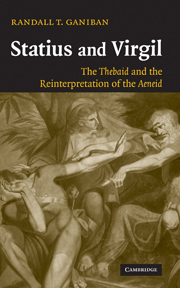Book contents
- Frontmatter
- Contents
- Preface
- List of abbreviations
- 1 Introduction
- 2 Oedipus' curse
- 3 Horror, prophecy, and the gods
- 4 Hypsipyle's narrative of nefas
- 5 Bacchus and the outbreak of war
- 6 Dis and the domination of hell
- 7 Delay and the rout of Pietas
- 8 Spectacle, crime, and monarchy at Thebes
- 9 Pietas, burial, and clementia in a world of nefas
- Works cited
- General index
- Index locorum
5 - Bacchus and the outbreak of war
Published online by Cambridge University Press: 22 September 2009
- Frontmatter
- Contents
- Preface
- List of abbreviations
- 1 Introduction
- 2 Oedipus' curse
- 3 Horror, prophecy, and the gods
- 4 Hypsipyle's narrative of nefas
- 5 Bacchus and the outbreak of war
- 6 Dis and the domination of hell
- 7 Delay and the rout of Pietas
- 8 Spectacle, crime, and monarchy at Thebes
- 9 Pietas, burial, and clementia in a world of nefas
- Works cited
- General index
- Index locorum
Summary
The drought that Bacchus sends against the Argive army in book 4 has implications that extend beyond Hypsipyle's narrative. When Hypsipyle finishes her tale in book 5, other events take place as a result that keep the Argives in Nemea for another book and a half: the death of the infant Opheltes and the baby's funeral games. And when the Argives restart their march against Thebes in book 7, they are once again seen by Bacchus, who appeals to his father Jupiter for help in thwarting the attack, but to no avail (7.145–226). The war begins soon thereafter.
Chapter 4 showed how one of the results of Bacchus' actions, Hypsipyle's narrative, enacted the irrelevance of pietas through its direct intertextual engagement with the Aeneid. This chapter will examine Bacchus' delaying itself. His most important poetic model is Juno of Aeneid 7. But whereas Juno attacks her enemies with success by inciting a terrible war, Bacchus achieves very little. The Bacchus episodes thus display an interesting intertextual phenomenon we have seen at play already: Statius uses an epic model who succeeds in the Aeneid for a character who fails in the Thebaid. Bacchus' failures are especially significant because there are other Statian characters (infernal figures such as Oedipus, Dis, and Tisiphone), also modeled on Juno of Aeneid 7, who are thoroughly effective.
- Type
- Chapter
- Information
- Statius and VirgilThe Thebaid and the Reinterpretation of the Aeneid, pp. 96 - 116Publisher: Cambridge University PressPrint publication year: 2007



